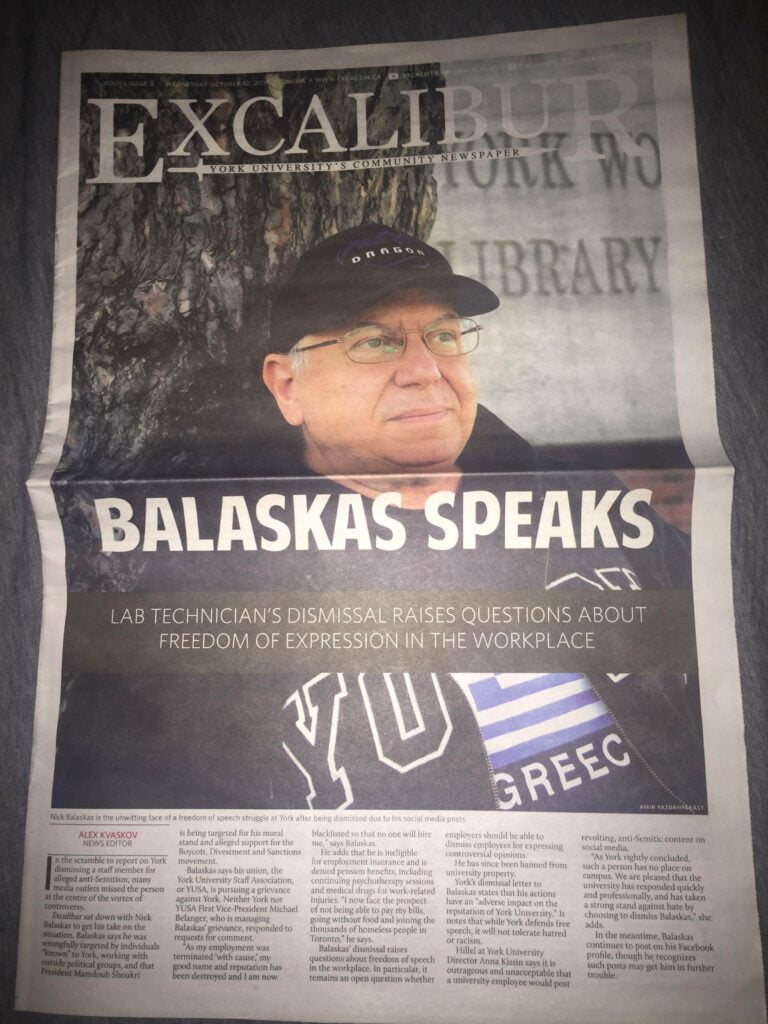
In August, Bnai Brith dutifully called upon York University to take action against Nicholas Balaskas, a non-academic faculty member, after Jewish students complained of his antisemitic hate speech, found on his personal Facebook account.
Having read said hate speech, I can vouch for the fact that this sort of antisemitism goes far beyond the regular anti-Israel bias that is all too common in the post-secondary sector (and to which Balaskas is also no stranger). Holocaust denial is a revolting form of antisemitism that belittles the genocide that nearly wiped out European Jewry. Theories of conspiracy, of Jewish elites controlling global financial and political institutions, or the bizarre ramblings of Jews being behind the Sept. 11 attacks, are steeped in millennia-old prejudice and disgust for the Jewish people.
Yet even following this person’s dismissal, acceptance of, and empathy to, Balaskas unfortunately remains.
As if the thousands of unread, untouched newspapers left all over campus every single week weren’t indications enough of Excalibur‘s utter failure as a publication, “York University’s Community Newspaper” has hit yet a new low in substandard journalism.
This week’s cover of Excalibur bore a closeup photo of Balaskas, looking ever so innocently into the distance, with the headline “Balaskas Speaks: Lab technician’s dismissal raises questions of freedom of expression in the workplace.”
Without ever specifying any examples of Balaskas’ hate-filled ramblings on Facebook, Alex Kvaskov, who frequently covers matters related to the Israeli/Arab conflict at York, shows a lighter, more sympathetic side of the man who was terminated for allegedly racist online postings. Much of the piece includes quotations from Balaskas describing the woes of his termination, such as the termination of is employment benefits and the prospect of financial hardships.
Be still, my bleeding heart.
Following this is a line about how the dismissal “raises questions about freedom of speech,” and about employers terminating employees for their expression of “controversial opinions.”

Kvaskov paints a picture of Balaskas as a victim. He attempts to humanize this warped, marginal human being by portraying him as a sympathetic victim of rigid ordinances pertaining to freedom of expression. That this poor worker was fired for humbly using his freedom of expression to voice unpopular viewpoints, thus raising questions about freedom of expression.
Who exactly is raising these questions? Where are the voices supposedly making the case for this person? Just who pray tell is “asking questions” about freedom of speech in the workplace? Why are they not present in the coverage of this event with a spin about freedom of expression? It seems that it’s simply Kvaskov projecting his own biases to spin a story in the fashion that fits his view of this episode.
Factually, this guy’s freedom of speech was not adulterated. Surely, faculty and non-academic staff agree to abide by some sort of behavioural code when signing employment contracts with the university.
I’m sure somewhere there is a clause about engaging in behaviour deemed as racist or discriminatory. Bnai Brith’s Campus Advocacy Coordinator, Aidan Fishman, brings up the fact that, “York’s own Secretariat Policy on racism entitles the university to discipline staff members who engage in racism, including antisemitism.”
Furthermore, find me an expert on human rights, anti-racism or equality that subscribes to an absolutist position on freedom of speech, that supposes that even racist screed such as denial of the Holocaust is acceptable in society, and legally protected. You’d be hard-pressed to do so.
Balaskas gets a whitewash from Excalibur‘s news editor because the targets of his racist screed were Jews. Had it been any other minority group, you’d better believe he would not have been portrayed as a victim. Had his ramblings been about, for example, the over-exaggeration of black slavery in America, of the logic of apartheid in South Africa, of the benevolence of residential schools in Canada or any other historical atrocity, Kvaskov would likely not have minimized the severity of those conspiracy theories as “controversial opinions.”
Fortunately, the thousands of untouched newspapers each week and the inactive social media presence means Excalibur‘s reach is limited at best.
Balaskas may be gone, but the problem of Excalibur and Kvaskov empathizing with a propagator of hate propaganda such as Balaskas continues to reduce the lamentable issue of antisemitism at York University.
Willem Hart is currently finishing up an undergraduate degree at York University and has been involved in Israel advocacy and education through Hasbara at York. He is also an alumni of the StandWithUs Canada Emerson Fellowship.


